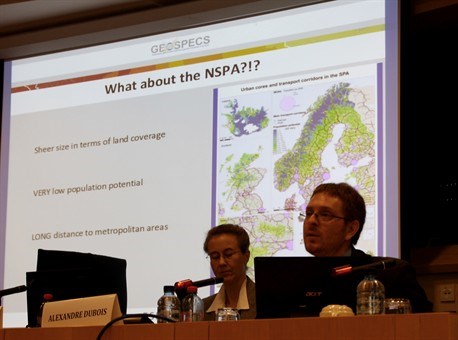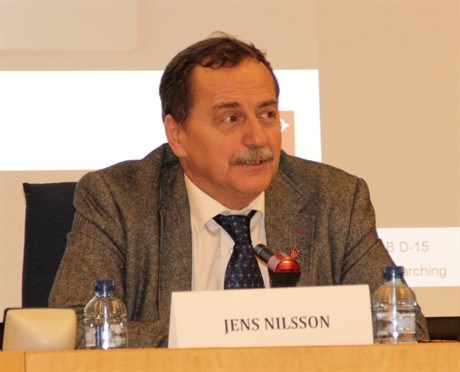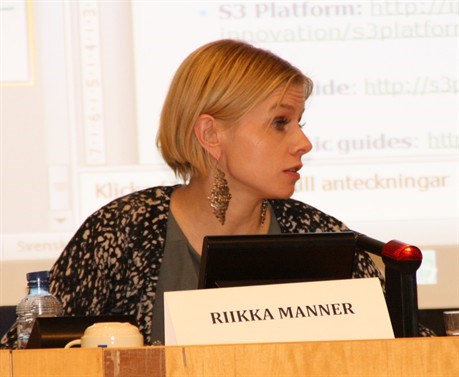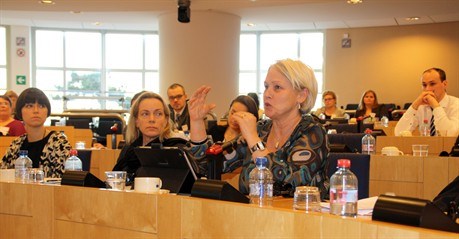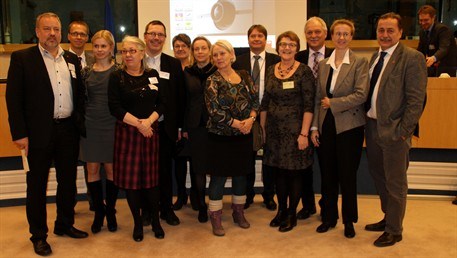Seminar in the European Parliament on EU Cohesion Policy in the NSPA
The NSPA seminar, on the 29th of November in the European Parliament, hosted by Swedish MEP Jens Nilsson and Finnish MEP Riikka Manner attracted more than 70 participants to get new thoughts on the value of EU Cohesion Policy in the NSPA. Invited speakers discussed the role of territorial cooperation and the importance of smart specialization to realize regional development potential. Participants also had the chance to hear about lessons learned from the NSPA experience and good examples from regions with different specificities.
Cohesion policy as a Tool for Smart Growth and an Attractive region -Europe 2020 and Northern Sparsely Populated Areas
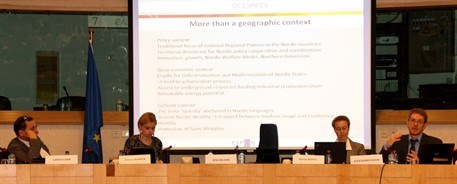
Moderator Mr. Jens Nilsson, MEP and former mayor of the city of Östersund in Jämtland, Sweden, opened the seminar giving a brief background to the work of the NSPA network. He hoped the seminar would provoke good conversation and remind the regions on the benefits of successful cooperation.
NSPA - an example for the EU
First speaker, Mr. Alexandre Dubois, Research Fellow from NordRegio, gave the audience a briefing on GEOSPECS project, which under the EU ESPON programme studied regions with specific characteristics. According to the study NSPA could be good example for the EU on successful development and cooperation despite handicaps.
- Current regional policy is focusing on growth and sustainable development rather than on compensation for handicaps, Mr. Dubois said.
The feedback from stakeholder consultation on fall 2011 showed how main challenges for the NSPA are remoteness, small size economies, geographic specificities, lack of diversification and unfavorable demographic patterns. Despite these handicaps there are also lots of potential for future development, like high social capital, abundant natural and energetic resources and good tourism potential. Findings from the study suggest that the areas with handicaps should try to move away from benchmarking, because each area has different strengths and potential even though the main challenges are the same. Territorial cooperation should also be promoted both among and within sparsely populated areas.
NSPA - a Smart Region?
Ms. Katja Reppel, Head of Sector for smart growth, DG Regio of the European Commission, highlighted smart specialization as a way forward for NSPA. Smart specialisation is a concept under Europe 2020: Innovation Union flagship initiative. Commission has noted how the Innovation Union must involve all regions and that's why it wants regions to build smart specialisation strategies and be active supporting those. Ms. Reppel also presented the latest Innovation Scoreboard 2012, in which most of the NSPA scores high. This should communicate positive message to the regions which aren't sure about their strengths and possibilities for future development.
- More than ever before innovation needs to be localised to serve specific market needs and SMEs and individuals can be as innovative as large companies, Ms. Reppel said.
There already are many examples of successful projects which have started from the idea of smart specialisation. These examples from North Sweden and Finland should encourage regions inside NSPA to ask enterprises what they need and to support future projects. According to Ms. Reppel the best lessons to learn from these successful projects have been the use of social capital, virtual networks and creativity and being boldly different. It is important to build innovations on all types of assets in a region and concentrate on the strengths and possibilities rather than handicaps.
Ms. Riikka Manner, MEP and reporter for the European Territorial Cooperation goal and member of REGI committee, briefed the territorial dimension of the NSPA.
- I'm very pleased to take part in this seminar and tell you how NSPA has always had a special place in my heart, Ms. Manner started.
She highlighted how territorial cooperation is a good starting point to problem solving and successful future development and she supports the regions to actively take part on projects under territorial programmes like the Northern Periphery Programme. Ms. Manner also wanted to highlight the successful cross-border cooperation between Finnish and Swedish towns Tornio and Haparanda because these kind of cooperation projects are good examples of EU funding being used effectively, which might have a significant importance in future negotiations.
Finally Ms. Manner expressed her worry on future ETC -programme funding, because the latest council negotiasons had showed worrying messages. All the regions and actors agree that it would be important to get the council decision for funding so that programmes could work in peace.
Mr. Nilsson concluded, encouraging the audience to be in contact with him and Ms. Manner if and when the regions need information on funding and latest council meetings. Ms. Manner also supported the regions to be in contact with their governments so that countries would do well in negotiations and so that the benefits would reach also the northern regions.
